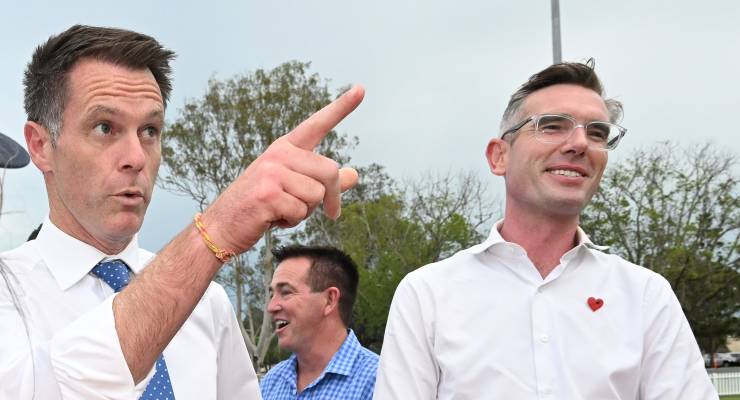
The NSW Electoral Commission (NSWEC) has warned enrolled voters they must apply for postal ballots by Monday, March 20 with early voting opening on Saturday ahead of the March 25 state poll.
As a peculiarly civil election campaign grinds on, albeit with plenty of grubby side skirmishes, the level of pre-poll voting is being closely watched as an indicator of which way the poll could swing as the Coalition government attempts to claw its way to a fourth term in office.
The NSWEC released initial postal numbers on Thursday, revealing it had received 464,114 ballot applications since applications opened on January 16.
“Strong postal vote application numbers show NSW voters are planning ahead, no matter where they will be on election day,” NSW electoral commissioner John Schmidt said.
He added that early voting centres will operate in each electoral district on March 18-24 (but not Sunday, March 19).
The state election will be the first since COVID struck and the sudden resignation of intensely popular premier Gladys Berejkilian forced by an investigation by the state’s Independent Commission Against Corruption, the findings of which will not be released until after the election.
Berejkilian’s resignation was particularly deeply felt in many migrant and ethnic communities who saw her as a role model, especially for women from non-English speaking backgrounds.
The incumbent government has rotated through four premiers, with the turnover at the top seemingly doing it little harm. Even so, a fourth term is a long shot, with a number of long-serving and well-liked ministers, such as Victor Dominello, departing the Parliament after more than a decade.
This said, polling remains close between the parties and preferred leaders, with a debate hosted by Nine scoring Dominic Perrottet ahead in a 4-3 verdict by The Sydney Morning Herald journalists. It’s not exactly a representative sample of the community, but not exactly a bastion of support for the incumbent government either.
Part of the challenge for Labor, which has been campaigning heavily on improvements to public services and wage rises for teachers and other government workers, is establishing a cultural connection with ethnically diverse communities in Sydney’s suburbs and regional areas.
Former premier Kristina Keneally suffered a horror backlash in the last federal poll after she was inserted over local candidate Tu Le, a Vietnamese-Australian lawyer, in the seat of Fowler in Sydney’s west.
Labor lost the seat with an epic 15.6% swing against the party.
Nevertheless, the Coalition has left its selection of candidates late in many seats it holds or is contesting, leaving little time for voters to get to know who is standing.
While also under attack from a range of so-called teal candidates, a serious threat comes from One Nation, which is led in NSW by former federal Labor leader Mark Latham. It recently picked up longstanding Labor member for Bankstown Tania Mihailuk after she was dumped from her former party’s ticket in a factional rout.
For the most part, the Coalition is campaigning on its economic and infrastructure credentials, attempting to pin Labor down on the cost of its pay rises for public sector workers.
This article first appeared in The Mandarin.








There is strong bias in this authors reporting.
The “resignation of intensely popular premier Gladys Berejkilian forced by an investigation by the state’s Independent Commission Against Corruption” Berejkilian was not forced to resign, she chose to resign. Plus, where is the proof of her popularity?
Probably in the same garbage can where evidence of Gladys being such a stickler for the rules is
One hopes the NSW Electoral Commission (NSWEC) replicates more the VEC and not the AEC when it comes to absentee or postal voting, offshore.
At national election the AEC posted votes offshore, anecdotally many of most in some places inc. EU, did not receive voting papers ever (alleging they were not even posted?) vs. a minority who had voting papers sent by courier? There has been no explanation from the AEC, hence, many suggest it was a ham fisted form of voter suppression?
However, the Victorian election the VEC sends an email to those registered, unique code, access website, download/print papers, complete with a witness, then return; why couldn’t the AEC reflect the 21st century?
At national election the AEC posted votes offshore, anecdotally many of most in some places inc. EU, did not receive voting papers ever (alleging they were not even posted?) vs. a minority who had voting papers sent by courier? There has been no explanation from the AEC, hence, many suggest it was a ham fisted form of voter suppression?
However, the Victorian election the VEC sends an email to those registered, unique code, access website, download/print papers, complete with a witness, then return; why couldn’t the AEC reflect the 21st century?
If this PR handout rewrite/tripe was produced by a “senior reporter” at The Mandarin it’s hard to imagine what the interns churn out.
Gladys was intensely popular with ICAC investigators, sure.